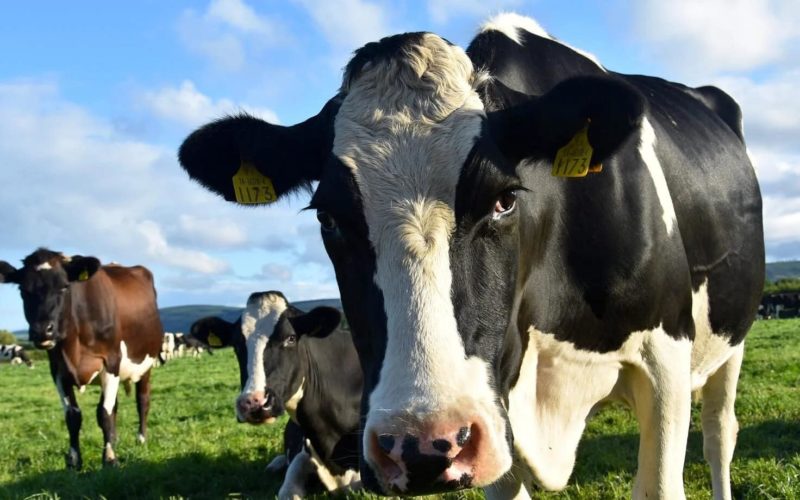HIGHTIMES
A new study from researchers in Germany has determined that dairy cows that were fed industrial hemp produced milk with detectable levels of delta-9 THC, the cannabis compound most closely associated with the high produced by marijuana. The cows also exhibited behavioral changes, indicating that the animals might have been feeling the effects of the cannabinoids contained in the hemp feed.
“This is important, as we had no data to know to what extent cannabinoids entered the milk of dairy cows,” Michael Kleinhenz, an assistant professor in beef production medicine at Kansas State University College of Veterinary Medicine who was not involved in the research, told NewScientist.
To conduct the study, researchers at the German Federal Institute for Risk Assessment fed 10 lactating dairy cows differing amounts of hemp feed containing a range of cannabinoid concentrations. The cows were studied over a period of weeks, with researchers collecting data on the animals’ behavior and conducting lab analysis on blood, milk, and fecal samples.
The researchers determined that the type of hemp feed given to the dairy cows played a role in the effect the feed had on the animals. Cows that were fed fermented feed made from whole hemp plants showed few differences compared to dairy cows given a traditional diet of corn feed.
However, the cows that were given feed made from cannabinoid-rich hemp leaves, flowers, and seeds exhibited noticeable behavioral changes. Additionally, the milk from the cows showed detectable levels of several cannabinoids including delta-9 THC. According to the researchers’ calculations, these cows consumed up to 86 times the amount of THC that is required to get humans high.
The effects observed by the researchers included slower heart rate and breathing, “pronounced tongue play, increased yawning, salivation, nasal secretion formation,” and reddening of a portion of the eyes, the report states. Some animals “displayed careful, occasionally unsteady gait, unusually long standing and abnormal posture.”
Robert Pieper, head of the department of food chain safety for the German institute and co-author of the new study, said that the cows that were given the hemp feed also ate less and produced less milk.
“That is a strong effect on animal health,” Pieper said, according to a report from The Washington Post. “Not a positive effect.”
Kleinhenz has conducted research on steers that were fed hemp at Kansas State University and noted that the animals tended to become calmer.
“We don’t know if they have that buzz or whatnot,” Kleinhenz said. But he added that the cattle have lower levels of stress hormones. He believes that the cannabinoids in the feed reduce stress, but “we still have to figure out that mechanism in animals.”
Hemp was legalized in the United States with the passage of the 2018 Farm Bill. But so far, the Food and Drug Administration has failed to allow cannabinoids including CBD into the U.S. food supply. Similarly, federal regulators have not yet approved animal feed made from hemp.
More Research Needed
Jeffrey Steiner, director of Oregon State University’s Global Hemp Innovation Center, has experimented with hemp as a feed supplement for dairy cows, sheep, and poultry. But he noted that the research only began in 2019 and several more years of study are needed before hemp animal feeds are approved by regulators.
“You’re not going to see CBD-enhanced milk on the shelf for a long time,” said Steiner, who did not have a role in the German study.
Serkan Ates, an agronomist at Oregon State University, Corvallis, has studied hemp consumption in cows, lambs, and chickens. He says that because of the potential to pass on cannabinoids in milk, “it may not be possible to feed this to high-yielding dairy cows.”
“But there is plenty of low-hanging fruit to explore, like feeding hemp to non–food-producing animals like heifers or young lambs,” Ates said.
Erica Stark, executive director of the National Hemp Association, said that high-quality animal feed can be made from hemp if regulators eventually give the nod.
“It’s going to be such a really large market,” Stark said. “There’s actually animal feed shortages in this country right now, ramifications of what’s happening in Ukraine, droughts and other crop failures.”
The study, “Transfer of cannabinoids into the milk of dairy cows fed with industrial hemp could lead to Δ9-THC exposure that exceeds acute reference dose,” was published online on November 14 by the peer-reviewed journal Nature Food.
H/T: www.hightimes.com



